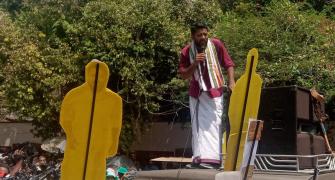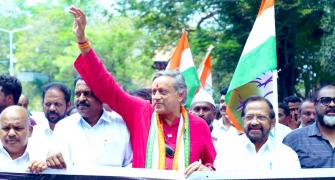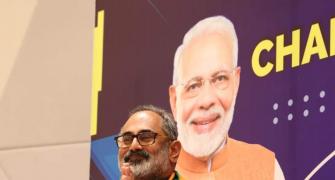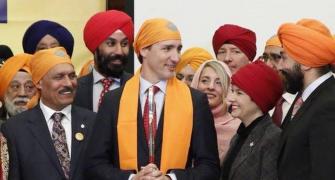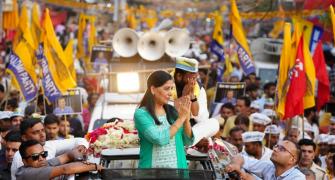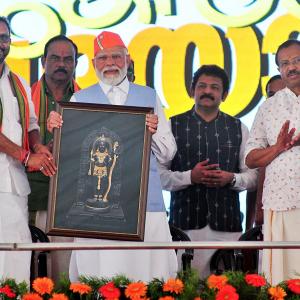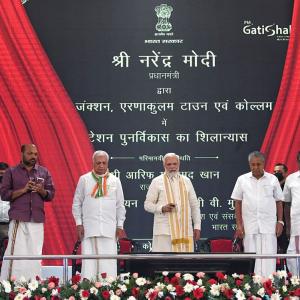I have a bit of a personal dilemma: I have a soft corner for Shashi Tharoor, but I do like Rajeev Chandrasekhar's pitch, confesses Rajeev Srinivasan.

As someone born and raised in Thiruvananthapuram, and one who returned after spending many years in Chennai, Bangalore, and the US, I have a personal emotional connection with this pleasant city by the sea.
At the same time, I am aware of many missed opportunities, as well as the general deterioration of the quality of life here, which was once upon a time hailed as 'the cleanest city in India'. (It isn't any more).
Without being uncritically nostalgic about the Travancore kingdom, let us note that they did not rule for personal glory: They explicitly ruled as regents of the tutelary deity, Sree Padmanabha, and thus they had a certain humility about themselves.
As a result, they did quite a lot for the public, which is largely the basis of the much-ballyhooed high Human Development Index that Kerala boasts of ad nauseam.
In fact, Thiruvanathapuram has some intriguing historical firsts: One of India's oldest golf courses, one of Asia's oldest zoos and museums, and an early airport which was the fifth-largest in India in passenger volume until a few years ago.
It was a finalist for the Indian Institute of Science; Travancore University invited Albert Einstein to be its vice chancellor.
Clearly, the Travancore kings believed in infrastructure. But in the recent past, the development story has turned negative: After the large investment in ISRO's first complex, there has been virtually no growth here.
This is of great concern to the local populace, and the Lok Sabha election may well be determined by who they believe will bring development.
There's an interesting three-way contest here, among the three-time incumbent Shashi Tharoor of the Congress, former MP Panniyan Ravindran of the CPI, and central minister of state for IT, Rajeev Chandrasekhar of the BJP.
I asked AI chatbot Google Gemini to help me write about this, but alas, it simply refused to do so, pleading ignorance, which was probably just as well, given the known biases of chatbots.
Therefore I asked perplexity.ai, which provided the following verbiage:
The Lok Sabha contest in Thiruvananthapuram for the upcoming elections is shaping up to be a significant battle involving key candidates like Shashi Tharoor, Rajeev Chandrasekhar, and Panniyan Ravindran.
This three-cornered fight highlights the political dynamics in Kerala's capital city, with each candidate bringing their own vision and promises for the region's development.
Shashi Tharoor
Shashi Tharoor, the current sitting MP from Thiruvananthapuram, is seeking re-election for the fourth time.
Tharoor's campaign focuses on highlighting his development initiatives over the past 15 years, emphasising projects like the National Highway-66 bypass, Vizhinjam International Seaport, and efforts to enhance air and rail connectivity.
Despite these achievements, Tharoor acknowledges that there are long-pending demands in the city due to administrative limitations and political resistance.
He also advocates for the Vizhinjam port's potential to boost Kerala's revenue and national security.
Tharoor's campaign underscores his commitment to addressing the needs of his constituents and his unwavering advocacy for the region's progress.

Rajeev Chandrasekhar
Rajeev Chandrasekhar, the BJP candidate, has entered the electoral fray with a vision to transform Thiruvananthapuram into a thriving IT hub and address the region's developmental challenges.
Chandrasekhar's campaign slogan, 'Ini Karyam Nadakkum' (Now things will work), reflects his promise to bring about positive change and progress to the city.
He aims to leverage his experience as a technocrat-turned-politician to drive development initiatives and attract investments, particularly in the IT sector.
Chandrasekhar's focus on performance-based politics and his mission to make Thiruvananthapuram an IT hub set the tone for a competitive electoral battle.

Panniyan Raveendran
Panniyan Raveendran, the CPI leader representing the Left Democratic Front, adds a unique dimension to the electoral contest.
Coming from a backward community, Raveendran positions himself as an underdog in the race, aiming to surprise others by emerging as a strong contender.
His campaign emphasises grassroots issues and the disenchantment among certain coastal communities, presenting an alternative perspective to the established candidates.
Raveendran's candidacy injects diversity into the electoral landscape, offering voters a choice beyond the traditional political narratives.

Development Initiatives and Challenges:
The electoral discourse in Thiruvananthapuram is underscored by a mix of past achievements, unfulfilled promises, and the quest for future progress.
While Tharoor highlights his track record of development initiatives and advocacy for key projects, Chandrasekhar's focus on making the city an IT hub and Raveendran's grassroots approach add layers to the contest.
The city's potential as a hub for technology, infrastructure, and economic growth remains a central theme, with candidates vying to address the region's developmental challenges and propel it towards a brighter future.
In conclusion, the Lok Sabha contest in Thiruvananthapuram encapsulates a dynamic interplay of visions, promises, and challenges, reflecting the diverse aspirations of the city's residents.
As the candidates engage in a spirited electoral battle, the focus on development initiatives, past achievements, and future prospects underscores the significance of this electoral contest in shaping the trajectory of Thiruvananthapuram's growth and progress.
The above (unedited) text is probably a fair and non-committal response from the AI search engine.

But I have a bit of a personal dilemma: I have a soft corner for Shashi Tharoor, but I do like Rajeev Chandrasekhar's pitch.
I know nothing of Panniyan Ravindran's tenure, which happened when I was elsewhere, but as a CPI MP, he might not have much of an opportunity to assert himself in Parliament.
I know Shashi because his sister was a good friend of mine in my Silicon Valley days, and I stand in awe of his skills as a wordsmith and as a speaker (I once suggested that he would be a great President of India).
Besides, I was delighted that he quoted one of my essays in a book of his.
I have met him several times, and he has an easy style and is likable as a person.
And when my mother passed away, he was kind enough to call me and convey his condolences.
I have never met Rajeev Chandrasekhar, but I share a Silicon Valley techie background with him, and can appreciate the fact that he has helped steer India into a reasonably good stance in new areas like semiconductors and AI.
His announcement of a centre for semiconductor technology at the Indian Institute of Space Science and Technology was welcomed enthusiastically by scientists and engineers I know.
So who has the best chance to win? The answer, my friend, is complicated.
Kerala is an unusual state by many measures, perhaps most noticeably in its sharp divide by community.
Nominally, everybody talks about secularism, but that hides demographic divides.
Extrapolating from the 2011 Census, there must be about 40% people with Hindu names, about 35% Muslims, and about 25% Christians.
I use the term 'people with Hindu names' advisedly, because a lot of them are hard-core and committed Communists, who, on average, are more anti-Hindu than anti-religion.
That could be because Communism in Kerala for all practical purposes functions as yet another Abrahamic religion.
Besides, quite a few converts to Christian sects are 'crypto': They have maintained their Hindu names so as to not raise alarm bells, and to illegally claim any reservation benefits.
Thus the number of hardcore Hindu voters is lower than what the Census might suggest, and my estimate is that it is only about 10%, which is a good reason why Hindu-leaning candidates have had a hard time in Kerala, even though Thiruvananthapuram is relatively welcoming to them.
The BJP has no seats in the assembly or Lok Sabha.
Those who have come to Thiruvananthapuram during the Attukal pongala, when something like 3-5 million women congregate here to cook a rice offering to the Devi in what is said to be the largest single gathering of women in the world, might wonder why devout Hindus don't get more votes.
After all, during the Sabarimala agitation too, women silently made their devotion clear.
There is a subtle reason: Hindu disunity, and specifically, animosity between the two biggest jatis in Kerala, the OBC Ezhavas and the forward caste Nairs.
As is demonstrated frequently, it has been business as usual for various interests to cause fractures and to amplify divisions between jatis and exploit them for electoral purposes.
There was animosity between Ezhavas (landless labourers) and Nairs (landlords or proxies of landowning Nambudiris) in the 19th century, and indeed, there was oppression and atrocities. But that was in the 19th century.

In the 20th century, leftist land-reform paupered the erstwhile landowners.
Meanwhile, some Ezhavas made good in a few sectors (I am reminded of Professor R Vaidyanathan's book Caste as Social Capital).
The result is that in the 21st century both Ezhavas and Nairs are equally well off, or equally badly off.
Redistributive 'justice', which once shared prosperity, is now sharing poverty, because there is no wealth creation, neither in agriculture nor industry in Kerala, and it survives precariously as a money-order remittance economy, as its recent woes in its inability to pay salaries and pensions demonstrates. The pie has simply not grown.
That being the case, there should not be any huge bitterness between Ezhavas (some 18% of the population) and Nairs (some 13%).
But there is, and it is assiduously cultivated by political parties.
Ezhavas largely vote for the CPI-M, and Nairs vote largely for the Congress. Thus there is no 'Hindu' consolidation or vote-bank.
This has practical consequences. The Congress and the CPI-M alternate in power, and their vote-banks are, respectively, in central Kerala around Cochin, and in northern Kerala around Kozhikode.
This has meant that Thiruvananthapuram has steadily lost out when new projects are mooted: IIT, REC, IIM, AIIMS, all gone elsewhere.
The Metro has been at a standstill for years; airport development has been nixed for a long time for want of 18 acres of land that owners are in fact willing to vacate; the Outer Ring Road project has been put on ice.
Strategic deep-water Vizhinjam container port was stalled for 40 years, and instead, shallow and unviable Vallarpadam elsewhere was showered with investment.
The possibility of a giant aerospace cluster connecting ISRO facilities at Valiyamala in Thiruvananthapuram, the rocket testing facility in Mahendragiri and the new launch pad in Kulasekharapatnam in neighbouring Tamil Nadu districts has not gone forward.
National Waterway III is blocked because a single tunnel in Varkala has not been fixed.
The list of grievances is endless. The question that may decide the battle is who the public believes will be able to deliver.
Shashi Tharoor can claim a role in Vizhinjam finally coming to fruition, and in helping Technopark bring in a few new GCCs.
He has had the disadvantage, though, of being in the Opposition for 10 years.

Can Rajeev Chandrasekhar do better, assuming the BJP returns to power at the Center?
Incidentally, Shashi and Rajeev are Nairs, and Ravindran is a Thiyya (the caste counterpart of Ezhavas in Malabar). All three are non-natives: Shashi's roots are in Palakkad in Malabar; Rajeev's are in Thrissur in Cochin; and Ravindran's are in Kannur in Malabar, a Left fortress.
On the one hand, Thiruvananthapuram voters like having a charismatic and well-spoken MP, which helps Tharoor, as it once helped V K Krishna Menon.
On the other hand, voters are eager to get their fair share of development, which Chandrasekhar may be able to bring about.
There's grave concern about the fact that there is virtually no employment available locally: all the youth end up migrating to West Asia (for a highly negative view of this, see Aadu Jeevitham (A Goat's Life) about the wretched, virtual slave life some migrants live) or to Europe or America.
The region is rapidly turning into an old-people's enclave, as the only jobs left are in healthcare, to care for the aging population.
Logistics, technology, and other development: That may well be the key to this election. And that is a good thing, too.
Traditional loyalties will still play a role, but whoever brings the most development to the area deserves to win.
For too long, people have lived in a fool's paradise of 'Kerala No. 1' while growth and prosperity have moved elsewhere.
Feature Presentation: Aslam Hunani/Rediff.com

